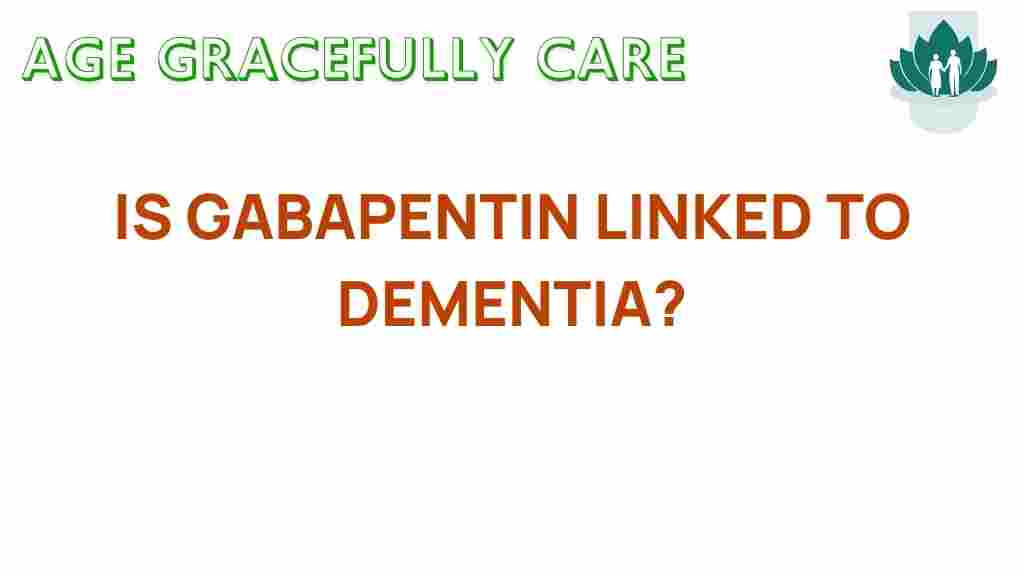The Gabapentin-Dementia Connection: What You Need to Know
As the population ages, concerns about dementia and cognitive decline are becoming increasingly prevalent. One medication that has garnered attention in this context is gabapentin, a drug primarily used to treat nerve pain and seizures. Understanding the gabapentin–dementia connection is essential for patients, caregivers, and healthcare professionals alike.
Understanding Gabapentin
Gabapentin is classified as an anticonvulsant medication. It is commonly prescribed for conditions such as:
- Nerve pain (neuropathy)
- Seizure disorders
- Restless leg syndrome
While gabapentin is effective for these indications, its effects on neurological health and cognitive function are areas of ongoing research. Some studies have raised questions about the potential risks associated with its use, particularly in older adults.
The Link Between Gabapentin and Cognitive Decline
Recent research findings have suggested a possible connection between gabapentin use and cognitive decline in elderly patients. When considering patient safety, it is crucial to evaluate how this medication may affect brain health over time.
Research Findings
Several studies have explored the effects of gabapentin on cognitive function:
- A study published in the Journal of Clinical Psychiatry found that older adults taking gabapentin experienced higher rates of cognitive impairment.
- Another research project indicated that gabapentin could exacerbate symptoms of dementia in patients already diagnosed with the condition.
- Some findings suggested that gabapentin might interfere with memory formation and retrieval, leading to increased difficulties in daily functioning.
These studies highlight the importance of monitoring cognitive health in patients prescribed gabapentin, particularly those with pre-existing neurological conditions.
Gabapentin and Patient Safety
When discussing the medication effects of gabapentin, healthcare providers must consider patient safety. Here are some key points to keep in mind:
- Individual Assessment: Each patient’s health history and current medications should be evaluated to determine the appropriateness of gabapentin.
- Watch for Symptoms: Caregivers and patients should be vigilant for signs of cognitive decline, such as confusion, forgetfulness, or changes in behavior.
- Consult Healthcare Providers: Regular check-ins with physicians can help assess the ongoing suitability of gabapentin, especially in older adults.
Step-by-Step Process for Safe Gabapentin Use
If you or a loved one has been prescribed gabapentin, following a structured approach can help mitigate risks associated with its use:
1. Discuss with a Healthcare Provider
Before starting gabapentin, have an open conversation with your healthcare provider about:
- Your medical history
- Current medications
- Any history of cognitive issues or dementia
2. Monitor Cognitive Changes
Keep track of any changes in cognitive function. Consider using a journal to note:
- Memory lapses
- Confusion or disorientation
- Changes in mood or behavior
3. Regular Follow-ups
Schedule regular appointments with your healthcare provider to:
- Review your treatment plan
- Discuss any side effects
- Assess cognitive function
4. Consider Alternatives
If cognitive decline is observed, discuss alternative treatments with your healthcare provider. There may be other medications or therapies that can effectively manage your symptoms without the associated risks.
Troubleshooting Tips for Patients and Caregivers
If you notice concerning symptoms while on gabapentin, consider the following troubleshooting tips:
- Document Symptoms: Keep a detailed record of any cognitive changes or side effects experienced.
- Immediate Communication: Reach out to your healthcare provider promptly if any symptoms emerge.
- Explore Support Groups: Engage with local or online support groups for individuals taking gabapentin; shared experiences can provide valuable insights.
Advice for Caregivers
As a caregiver, you play a vital role in monitoring the health of your loved one. Here are some additional tips:
- Stay Informed: Educate yourself about gabapentin and its potential effects on neurological health.
- Encourage Activity: Promote cognitive exercises and physical activity to help maintain brain health.
- Maintain a Routine: Establishing a daily routine can provide structure and stability, which may help mitigate cognitive decline.
Conclusion
The gabapentin–dementia connection is an area of growing concern in the field of healthcare. As research continues to uncover the effects of this medication on cognitive health, it is crucial for patients and caregivers to remain vigilant and informed. Monitoring cognitive function, maintaining open communication with healthcare providers, and being proactive about treatment options can help ensure better outcomes and enhance overall brain health.
In summary, while gabapentin can be a valuable tool for managing certain conditions, its use must be carefully considered, particularly in older adults or those with existing cognitive impairments. For more information on managing medications and ensuring patient safety, visit this resource.
For a comprehensive review of the latest research findings on gabapentin and its implications for cognitive health, check this study.
This article is in the category Health and created by AgeGracefullyCare Team
